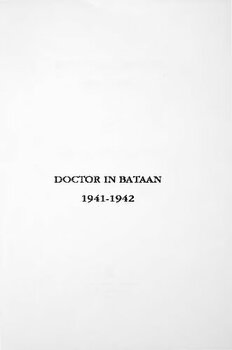
Doctor in Bataan, 1941-1942 PDF
Preview Doctor in Bataan, 1941-1942
DOCTOR IN BATAAN 1941-1942 DOCTOR IN BATAAN 1941-1942 by Manuel E. de Veyra, M.D. New Day Publishers Quezon City 1991 L) 3 ■: Copyright 1991 by MANUEL E. DE VEYRA and NEW DAY PUBLISHERS P.O. Box 167, 1100 Quezon City, Philippines 11 Lands St., VASRA Village, Quezon City Tel. No.: 99-80-46 All rights reserved. Cover Design: JOHN SIBAL ISBN 971-10-0460-7 To the "battling bastards of Bataan": (With "no mama, no papa, no Uncle Sam") my erstwhile comrades-in-arms, who unreservedly offered their lives for the defense of our country; And to my wife and family, who steadfastly stood by my side, spiritually and physically, maintaining our unity, loyalty and strength during those trying times . . . I humbly and wholeheartedly dedicate these memoirs, and pray that their loyalty and love will always be remembered. CONTENTS Foreword by Fr. Miguel A. Bernad, S.J., 9 Prologue, 11 Chapter 1 First Call: The Training School, 13 Chapter 2 Bataan: A "Prepared Defense Position," 17 Chapter 3 "Balita," 22 Chapter 4 Medical Resources, 27 Chapter 5 Sudden Death, 31 Chapter 6 Dwindling Resources and Vanishing Hopes, 34 Chapter 7 Other Doctors, 38 Chapter 8 Nurses on Bataan and Corregidor, 50 7 Chapter 9 The Fall of Bataan, 54 Chapter 10 The Death March, 59 Chapter 11 Capas, 68 Chapter 12 The Guava Detail, 73 Chapter 13 Questioning, 76 Chapter 14 Bilibid Prison, 83 Chapter 15 Freedom, 86 Chapter 16 Taps, 90 Pictorial Section, 95 Bibliography, 101 New Day Books on World War II, 103 8 FOREWORD THIS is an unusual book: an account of the War of 1941-1945 from the point of view of a physician. It is all here—the recruit ment and training of a medical corps, the hasty retreat to Bataan, the long siege, the dwindling resources, the casualties from Japanese shelling and bombing, the surrender, the Death March through Bataan and Pampanga to the horrible internment camp at Capas, the various "details" to obtain supplies, the smuggled letters; then the transfer to Bilibid Prison, and the final release. All these are given in a simple unvarnished account, with some details not perhaps known before. Dr. de Veyra comes from a family of unusual distinction. His father, Jaime C. de Veyra, was an associate of young Sergio Osmena in publishing one of the first Filipino daily newspapers of the twentieth century—El Nuevo Dia of Cebu. Like Osmena in Cebu and like Quezon in Tayabas, de Veyra became governor of his province of Leyte. He was then appointed member of the Philippine Commission, served as Resident Commissioner in the United States, and spent his maturer years as Director of the National Library. And,always, he maintained a scholarly interest in Philippine history and culture. Dr. de Veyra’s mother, Sofia Reyes de Veyra of Arevalo (Iloilo) and Negros, was, by title, social secretary but was, in fact,in charge of the house and activities of Malacanang during the Quezon presidency. Dr. de Veyra’s two sisters, Sister Rosario (RA) and Lourdes (Mrs. Exequiel Sevilla) have been teachers whose influence many women (some of whom have attained prominence) have acknowledged. 9 Dr. de Veyra’s brother, Judge Jesus de Vcyra, was perhaps one of the most extraordinary teachers of Law. He had a knack for reducing the most tangled legal technicalities into the simplest clarity. It is my regret that this outstanding lawyer and judge was not appointed to the Supreme Court, where his keen knowledge of the law, his utter honesty, and his strong sense of justice tempered with human kindness would have been great assets to that august tribunal—especially in the days of the Dictatorship when these qualities were most needed and were often wanting. 1 mention these personal details because they are not irrelevant. It was from such families that many young Filipino volunteers went to Bataan in December 1941 when they felt their country called them. One such volunteer, a young architect, newly married, said to his bride, "1 have to go or I won’t be able to live with myself. And you probably won’t respect me." It was that kind of idealism that was sacrificed in Bataan and Capas and betrayed by later politicians. Not the least of the betrayals was the abolition of "Bataan Day" and its replacement with something else "that would not offend the Japanese." For these various reasons, I congratulate Dr. de Vcyra for writing this book, and Mrs. Gloria F. Rodrigucz and New Day Publishers for publishing it. —Miguel A. Bernad, S J. Xavier University 15 February 1991 10
